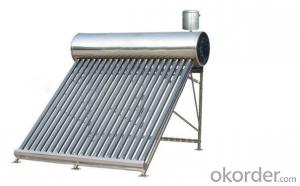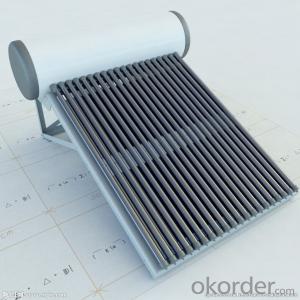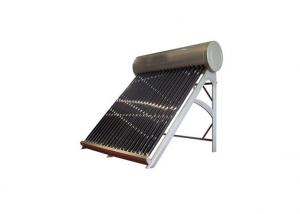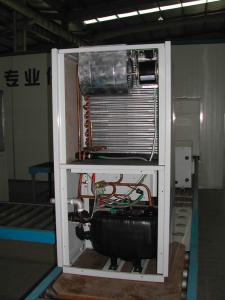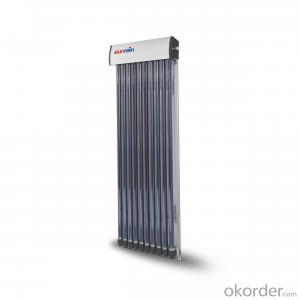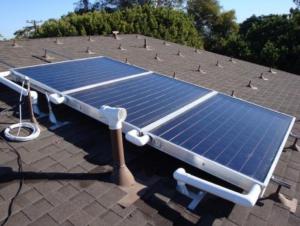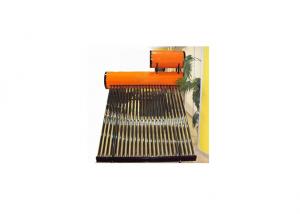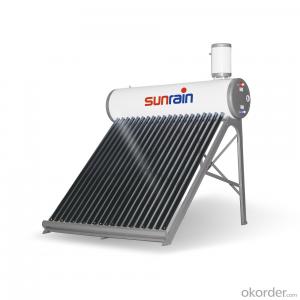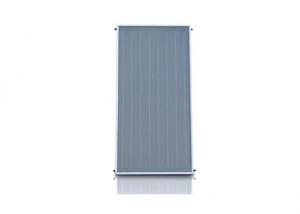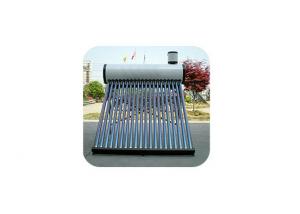Freestanding Vacuum Tube Unpressurized Solar Hot Water Heater
- Loading Port:
- China main port
- Payment Terms:
- TT OR LC
- Min Order Qty:
- 10 set
- Supply Capability:
- 10000 set/month
OKorder Service Pledge
OKorder Financial Service
You Might Also Like
Introduction of Non-Pressure Solar Water Heater:
Non-pressure Solar Heater is one of the most economical solar water heating device with pretty high efficiency at the same time. It consists of hot water storage tank, solar vacuum tubes with mouth plug in storage tank, and bracket supporting tank and tubes.When cold water in evacuated tubes is heated with solar irradiation, as the specific gravities of hot water and cold water are different, hotter water goes upward to storage tank and colder water goes downward to glass tubes. through this continuous circulation, the cold water in storage tank will be gradually heated till sunset.
Solar water heaters working principle
1. The solar collector absorbs solar energy and transmits it to the solar water heater tank through circulation
2. When the temperature of the collector reaches the set value, the controller starts the circulation pump automatically
3. The circulation pump makes heat-conducting liquid circulate automatically
4. The heat-conducting liquid transfers heat to water by lower heat exchanger in the water tank.
5. When the temperature difference between solar collector and heat pipe solar water heaters tank doesn't reach the set value, the circulation pump will be shut automatically
6. In case the temperature of the water tank does not reach Tmax, Electric Heating Element will start to work automatically
Solar water heaters working station component:
1. Operating screen
2. Manometer
3. Pump speed adjust switches
4. Temperature difference circulation pump
5. Flow rate indicator
6. Return circuit connector
7. Safety valve
Solar water heaters specification:
Description | solar water heaters |
Material of out manifold | 0.55mm thickness color steel/ fluorine carbon steel |
Material of inner tank | Food grade 2.0 mm thickness SUS304 stainless steel |
Tank insulating layer | 40mm 45kg/m³ high-density polyurethane foamed |
Inlet and outlet hole | Male G1'' |
Max pressure | 0.6 Mpa |
Solar collector tube | 3.3 Borosilicate glass with N/Al coating |
Thickness of glass tube | 1.6mm |
Vacuum tube tightness | P≤0.005 Pa |
Absorption | as=0.93-0.96 (AM1.5) |
Emission ratio | εh=0.04-0.06 (80C±5C) |
Idle sunning property parameters | Y=220~260m2.C/KW |
Average heat loss coefficient | ULT=0.6~0.7W/(m2.C) |
Bracket: | 2.0mm thickness aluminum alloy |
Tank weight | 75KGS |
Tank size | 560mm Dia x 1810mm Height |
Tank capacity | 300L |
Solar collector | 2pcs 58x1800x15tube solar collector |
Absorber area | 2.811 m² |
Working station | SP116 working station |
Heat exchanger length | Upper:12m, Underside:18m |
Solar water heaters details show:
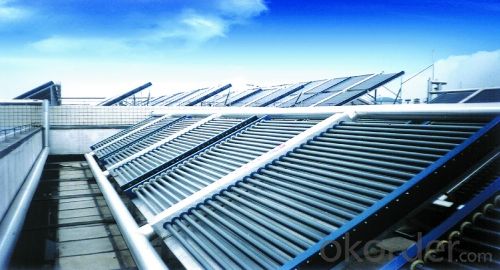
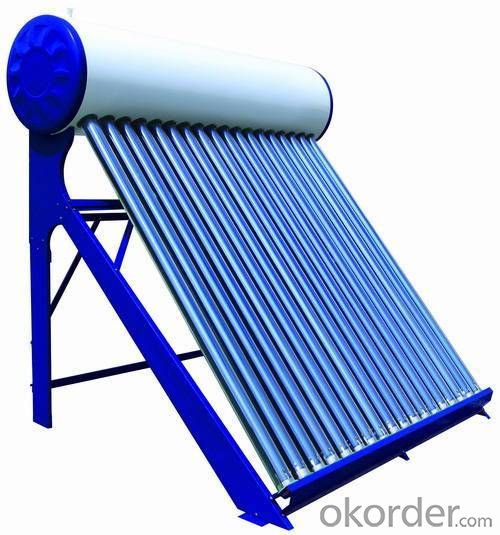
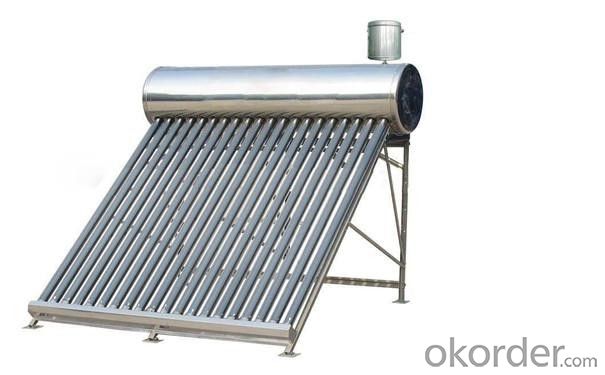
Benefits of this kind of solar water heaters:
1. Prolong the life of your existing water heater
2.Costs less than an electric, gas or oil water heater
3.No maintenance required
4.Lasts longer than a traditional hot water heater
5.Reduce your water heating costs
- Q:Can a solar water heater be used in areas with limited access to backup power sources?
- Yes, a solar water heater can be used in areas with limited access to backup power sources. Solar water heaters rely on the energy from the sun to heat the water, so they do not require electricity to function. As long as there is sufficient sunlight, the system can heat the water effectively without the need for backup power. This makes solar water heaters a great option for areas that have limited access to electricity or experience frequent power outages. Additionally, solar water heaters are often designed with storage tanks to store the heated water, allowing for use even when there is no immediate sunlight.
- Q:Air water heater advantages and disadvantages?
- 1 advantages: environmental protection and energy saving, because air heaters can not use gas, will not produce gas, so as not to destroy the ozone layer, but also because it saves the electricity, and reduce the consumption of electricity per time, can reduce the power of the 1.5 pounds of carbon dioxide, also can reduce the damage to the ozone layer. Therefore, the use of air heaters can also delay the warming of the earth"
- Q:Can a solar water heater be used to heat domestic hot water as well as space heating?
- Certainly! A solar water heater has the capability to heat both domestic hot water and space heating. There are two primary types of solar water heaters that can serve this purpose: active solar water heaters and passive solar water heaters. Active solar water heaters employ pumps and controls to circulate water or heat transfer fluid throughout the system. These systems can be designed not only to heat domestic hot water, but also to transfer the heated fluid to a heat exchanger or radiant flooring system for space heating. Consequently, the heated fluid can be utilized to warm the air in the space or provide radiant heat through the floors. On the other hand, passive solar water heaters rely on natural convection and gravity to circulate the water or heat transfer fluid. Typically, these systems are used for domestic hot water heating, but they can also be integrated with space heating systems. As an example, a passive solar water heater can be connected to a radiant flooring system, allowing the heated fluid to warm the floors and provide space heating. In both instances, the solar water heater represents an economical and sustainable solution for supplying both domestic hot water and space heating. By harnessing the sun's energy, these systems can significantly decrease reliance on conventional heating methods, leading to reduced energy bills and carbon footprints.
- Q:What is the expected lifespan of the circulation pump in a solar water heater?
- The expected lifespan of a circulation pump in a solar water heater varies depending on various factors such as the quality of the pump, usage patterns, maintenance, and environmental conditions. However, on average, a well-maintained circulation pump in a solar water heater can last anywhere between 10 to 15 years.
- Q:How does the control system of a solar water heater compare to a traditional water heating system?
- The control system of a solar water heater differs from a traditional water heating system as it primarily relies on sensors and controllers to monitor and regulate the temperature of the water. It automatically adjusts the flow of water and directs it through the solar collectors for heating. In contrast, a traditional water heating system typically uses manual controls such as thermostats and pressure valves to maintain the desired temperature. Additionally, the control system of a solar water heater is designed to optimize energy efficiency by utilizing solar power, whereas a traditional system may rely on gas or electricity for heating.
- Q:How does a solar water heater impact the overall energy consumption of a household?
- A solar water heater can significantly reduce the overall energy consumption of a household. By using sunlight to heat water, it reduces the reliance on electricity or gas-powered water heaters, resulting in lower energy bills. This renewable energy source helps to conserve non-renewable resources and decrease greenhouse gas emissions, making it an environmentally friendly choice.
- Q:Can a solar water heater be used in areas with limited access to sewage infrastructure?
- Yes, a solar water heater can be used in areas with limited access to sewage infrastructure. Unlike traditional water heaters that rely on gas or electricity to heat the water, solar water heaters utilize the sun's energy to heat the water. They typically consist of solar panels that absorb sunlight and transfer the heat to a storage tank, which then supplies hot water to the household. Since solar water heaters do not require any connection to the sewage system, they can be installed and used in areas without proper sewage infrastructure. The system only needs a water supply to fill the storage tank, and the heated water can be used for various purposes such as bathing, washing clothes, and dishes. In areas with limited access to sewage infrastructure, alternative methods for wastewater disposal can be implemented, such as the use of septic tanks or other on-site treatment systems. These systems can handle the wastewater generated from the use of a solar water heater, ensuring proper sanitation and environmental protection. Additionally, the use of solar water heaters in areas with limited access to sewage infrastructure can have significant benefits. It reduces the reliance on traditional fossil fuel-based energy sources, which helps to mitigate climate change and reduce air pollution. It also provides a reliable source of hot water, which can improve hygiene and overall quality of life in these areas. Overall, solar water heaters are a sustainable and viable option for heating water in areas with limited access to sewage infrastructure.
- Q:Can a solar water heater be installed in a location with limited sunlight?
- Although limited in sunlight, a solar water heater can still be installed and provide benefits. While optimal performance is achieved in sunny areas, even on cloudy days, solar water heaters can generate heat from available sunlight. Technological advancements have increased efficiency, enabling the capture and conversion of small amounts of sunlight into usable heat. However, it is crucial to consider that the overall performance of a solar water heater is dependent on the sunlight available. In locations with limited sunlight, it may be necessary to use an alternative heating source alongside the solar water heater to ensure a continuous supply of hot water.
- Q:Can a solar water heater be used in conjunction with a swimming pool?
- Yes, a solar water heater can be used in conjunction with a swimming pool. Solar water heaters are designed to capture and utilize the sun's energy to heat water, which can be used for various purposes including heating pools. By connecting a solar water heater system to a swimming pool, the water can be efficiently heated using renewable energy, reducing reliance on traditional heating methods and saving on energy costs.
- Q:Can a solar water heater be installed on a flat roof?
- Yes, a solar water heater can be installed on a flat roof. In fact, flat roofs are often preferred for solar water heater installations due to their accessibility and ease of installation.
1. Manufacturer Overview |
|
|---|---|
| Location | |
| Year Established | |
| Annual Output Value | |
| Main Markets | |
| Company Certifications | |
2. Manufacturer Certificates |
|
|---|---|
| a) Certification Name | |
| Range | |
| Reference | |
| Validity Period | |
3. Manufacturer Capability |
|
|---|---|
| a)Trade Capacity | |
| Nearest Port | |
| Export Percentage | |
| No.of Employees in Trade Department | |
| Language Spoken: | |
| b)Factory Information | |
| Factory Size: | |
| No. of Production Lines | |
| Contract Manufacturing | |
| Product Price Range | |
Send your message to us
Freestanding Vacuum Tube Unpressurized Solar Hot Water Heater
- Loading Port:
- China main port
- Payment Terms:
- TT OR LC
- Min Order Qty:
- 10 set
- Supply Capability:
- 10000 set/month
OKorder Service Pledge
OKorder Financial Service
Similar products
New products
Hot products
Hot Searches
Related keywords
